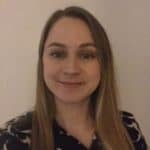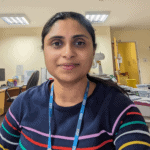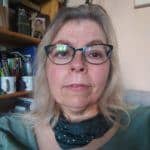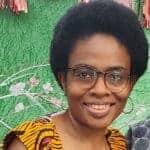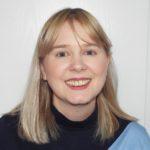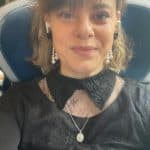Profile
Hannah Tanner
Clinical Scientist (I work in a hospital laboratory)
-
About Me:
I am a Clinical Scientist and work at the UK Health Security Agency in Birmingham. I live in Solihull in the West Midlands with my husband. I love nature and wildlife. I’m a youth group leader at my church where I like to run fun science activities.
-
My pronouns are:
she/her
-
My Work:
I’m a clinical scientist in microbiology. I work in a hospital lab and help design the tests that help doctors know if their patients have got an infection and what to treat them with.
-
Read more
I’m a microbiologist and that means I work with micro-organisms. Micro-organisms are living things that are so small you need a microscope to see them like viruses, bacteria and some fungi and parasites.
A clinical or medical microbiologist like me works with micro-organisms that can cause disease and make humans ill. The hospital laboratory where I work gets hundreds of samples from people with infections every day. The samples get taken by doctors and nurses and get sent to our laboratory. We get urine, poo, sputum (spit), skin swabs, nose and throat swabs, blood samples, pus, bits that surgeons have cut off and a whole lot more. It can be quite disgusting but it’s always interesting.
Once we get the samples we test them depending on what they are and what the doctor thinks is wrong with the patient. We have lots of different ways of finding micro-organisms in the samples: we can look at the sample down a microscope, we can grow bacteria or fungi on agar plates or, if the micro-organisms won’t grow on agar plates we can find their DNA and tell what they are.
Once we know what micro-organisms are in a patent’s sample we can find out what antibiotics or other drugs will help kill them and cure the patient.
My work is mainly to help design new tests so we can find more disease causing organisms, find them faster, find them more accurately or tell more information about them.
-
My Typical Day:
I get up at 6:30 to get our of the house for 7:20. I then have a short walk to the bus stop and get the bus to work. It drops me off right outside the hospital where I work.
When I get to work I usually go straight into the lab to check the people in my team are ok, that all the lab machines are working and see if there’s anything I ned to deal with urgently. If everything’s ok I go and get a coffee, check my e-mails for anything urgent then plan my day.
Usually my days include things like:
Background reading and learning about whatever new thing I’m working on
Practical work in the lab and running experiments
Analysing results
Writing reports and documents
Discussion with other scientists and medics in my lab or in the rest of UKHSA or the NHS
Troubleshooting machines that go wrong
Teaching people how to run tests and use machines
-
Read more
There are lots of different things I do during the day.
At the start of a new project I spend a lot of time finding out background information. I go to scientific conferences to see what other scientists are doing round the world, I read scientific papers and sometimes I just “google” to find out what’s out there on the internet.
Some days I get my white coat on and work in the laboratory doing experiments. I’ll be trying new things to see what works best. I also spend a lot of time in the lab when I have a new test method working but need to test it against lots of samples. We have to be really careful that we are 100% sure the results of the tests we do are correct because people’s lives might depend on them.
After I’ve done the lab work, I spend time writing. Scientists have to write up everything they do so that other people can understand what they did and why. If the results are really important I will try and get them published in a scientific journal so other scientists from all over the world know about my work.
On most days I end up giving expert advice. I work with the biomedical scientists who carry out the tests I have designed so if anything goes wrong we can work out the problem and fix it together. I also talk to doctors and nurses to explain the tests we do so they can send us the right samples from patients at the right time.
-
What I'd do with the prize money:
Something to help more people find out how brilliant microbiology is. I’d like to do a UKHSA stand at the Big Bang Fair.
-
Education:
1995-1997 Six Form College in Nottingham
1997-2001 Cardiff University
2001-2005 Nottingham University
2008-2010 (part time) University of London
-
Qualifications:
9 GCSEs grade A*-B
A level Biology, Chemistry and Physics
BSc in Microbiology
MSc in Clinical Microbiology
PhD in Molecular Microbiology
-
Work History:
Quality control in a pencil factory
Administration for a power company
Development technician in a cosmetics and toiletries factory
Research scientist in a clinical microbiology lab
Clinical scientist
-
Employer:
United Kingdom Health Security Agency (UKHSA)
-
My Interview
-
How would you describe yourself in 3 words?
Introverted, Persistent, Honest
What did you want to be after you left school?
Some kind of biologist
Were you ever in trouble at school?
I was often in trouble at school – mostly for talking too much in class
If you weren't doing this job, what would you choose instead?
A Biomedical Scientist
Who is your favourite singer or band?
No favourite – I like indie rock stuff mostly
What's your favourite food?
Haribo Tangfastics (but only as a treat)
If you had 3 wishes for yourself what would they be? - be honest!
1) to be more patient 2) to have the people I love with me 3) to find the ultimate cure for acne
-

